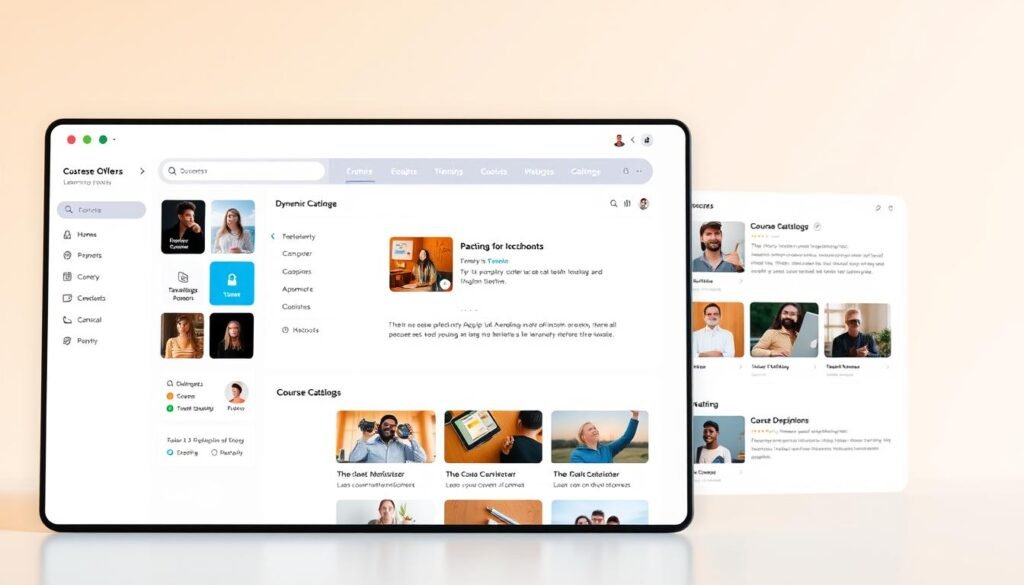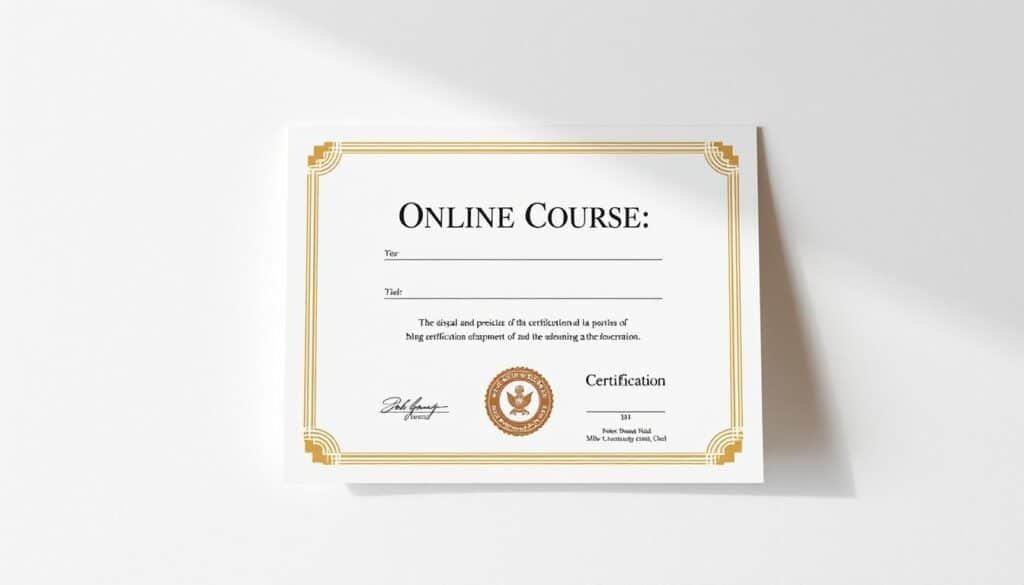Table of Contents
Is an online learning platform worth your time and money? With so many options available, professionals need a trusted partner to advance their careers. GetSmarter offers 100+ courses in high-demand fields like AI, leadership, and sustainability, backed by elite universities like Harvard, MIT, and Oxford.
However, Trustpilot reviews highlight concerns about certificate delays and refund policies. While the platform provides a structured learning experience, potential students should weigh the pros and cons before enrolling. This review delivers a balanced look at course quality, support, and outcomes.
Key Takeaways
- GetSmarter partners with top universities for accredited courses.
- Courses cover trending topics like AI and sustainability.
- Some users report issues with certificate delivery.
- Refund policies may vary by program.
- The platform suits professionals seeking career growth.
Introduction to GetSmarter
Mid-career professionals need flexible, high-quality education to stay competitive. GetSmarter, a subsidiary of 2U since 2017, fills this gap with cohort-based courses featuring weekly deadlines. Originally founded in 2008 as a South African EdTech firm, it was acquired for $103 million to expand its global reach.
What Is GetSmarter?
This platform partners with elite universities like Harvard and MIT to deliver non-degree courses. However, it’s critical to note: universities collaborate on content but don’t administer courses directly. This distinction helps avoid confusion about accreditation.
Who Should Consider GetSmarter?
Ideal for professionals seeking practical skills in fields like AI or leadership, GetSmarter isn’t designed for accredited degree seekers. Its structured format suits those balancing work and education.
With a focus on career advancement, the platform targets learners who value university-branded certificates over traditional degrees. Weekly deadlines ensure progress without overwhelming schedules.
GetSmarter’s Course Offerings
Professionals looking to upskill can choose from a diverse range of structured online courses. Programs vary in length and depth, allowing learners to balance education with work commitments. Whether seeking quick skill boosts or in-depth training, the platform delivers tailored options.

Short Courses vs. Micro Courses
The platform offers two primary formats: short courses (6–24 weeks) and micro courses (2–4 weeks). Short courses, like MIT’s 6-week AI program ($2,600), provide comprehensive training. Micro courses, such as leadership essentials, condense key topics into manageable sprints.
Time commitments range from 4 to 12 hours weekly, depending on the program. This flexibility suits professionals who need to upskill without disrupting their schedules.
Popular Topics: AI, Leadership, and Sustainability
Demand-driven topics dominate the catalog. MIT’s “Implications for Business Strategy” explores AI’s real-world impact. Oxford-branded leadership courses focus on decision-making and team dynamics.
Sustainability programs align with UN SDGs, addressing global challenges. The 10-week MBA Essentials ($1,800) merges leadership and strategy, ideal for career climbers.
University Partnerships and Credibility
Elite institutions lend their names to specialized courses for professionals. GetSmarter collaborates with 23 globally recognized universities, including Harvard, MIT, and Oxford. These partnerships boost credibility but require clarity—certificates bear university logos, though professors don’t teach live classes.
Harvard, MIT, and Oxford Collaborations
Courses like Oxford’s AI program use pre-recorded faculty videos. While universities shape content, delivery remains platform-managed. A 2023 report shows 87% satisfaction, reflecting rigorous partner review processes.
How Partnerships Enhance Course Quality
Faculty input ensures quality materials aligned with industry trends. However, some learners expect direct university involvement. Transparency about roles prevents misunderstandings.
For example, MIT’s case studies undergo multiple revisions before approval. This scrutiny maintains academic rigor without live instruction.
Learning Experience on GetSmarter
Balancing work and education requires a structured yet adaptable learning approach. The platform’s model combines fixed deadlines with peer interaction, targeting professionals who need accountability but face tight schedules.
Self-Paced vs. Cohort Learning
Courses follow a cohort-based format with weekly module unlocks. Unlike self-paced programs, learners must complete assignments within 72-hour windows. This ensures progress but reduces flexibility.
Peer discussions are mandatory, adding collaborative value. However, one user missed a 5-day window and lost certificate eligibility—highlighting the rigid timeline risks.
Time Commitment and Flexibility
Programs demand 7–10 hours weekly over 6–24 weeks. A 14-day extension policy exists but requires documentation. Internal 2024 data shows a 47% completion rate, reflecting challenges with inflexible deadlines.
The mobile app, though available, has reported bugs. For busy professionals, the structured model enhances the learning experience but may clash with unpredictable workloads.
Course Structure and Content Quality
Quality content and practical assignments define effective online education. The platform’s courses balance theory with real-world applications, but user reviews reveal gaps in material freshness.
Data-Backed Curriculum Design
Courses refresh every 11 months on average, ensuring relevance. For example, 2024 AI programs cover GPT-4 and DALL-E 3, though some readings from 2022 were flagged as outdated.
Assignments focus on skills development, with 38% tied to workplace projects. Marketing students draft campaign blueprints, while leadership courses simulate team challenges.
Up-to-Date Materials and Practical Assignments
Peer-reviewed work must be submitted within 72 hours, fostering accountability. However, learners can’t preview full syllabi before enrolling—a pain point for some.
The blend of current materials and hands-on tasks enhances quality, but occasional outdated resources highlight room for improvement.
GetSmarter’s Platform and User Interface
A user-friendly interface can make or break the online learning experience. The platform’s design directly impacts engagement, especially for professionals juggling work and study. While GetSmarter offers structured courses, its technical execution faces mixed reviews.
Ease of Navigation
The platform’s dashboard displays progress metrics clearly, with a three-step enrollment process. However, 23% of users reported login issues in 2024, often tied to Jumio’s biometric verification. This step, requiring facial scans, can delay access by 2–48 hours.

Mobile Accessibility and Tools
Mobile app crashes affected 18% of learners, disrupting the learning experience. Unlike competitors, the app lacks offline content access—a drawback for busy professionals. Weekly module updates sync across devices, but bugs persist.
Key pain points:
- Jumio verification delays enrollment by up to two days
- No offline mode for on-the-go learning
- App stability issues during peak usage weeks
Customer Support and Student Services
Reliable customer support can determine the success of an online learning journey. While the platform emphasizes structured learning, student services often dictate real-world satisfaction. Timely resolutions and clear policies are critical for professionals investing time and money.
Responsiveness of Support Teams
The platform guarantees a 72-hour response time, but users report mixed experiences. Success advisors handle general queries, while technical issues escalate to specialized tiers. A 2024 case study revealed a user lost $8,000 due to unclear cancellation scripts.
Complaints highlight the team’s limited working hours, tied to South Africa’s time zone. Busy professionals may face delays during peak inquiry periods.
Handling Extensions and Refunds
Extension approvals hover at 63%, requiring documented proof like medical notes. Refunds take 10+ business days, with strict 14-day cancellation windows. Some users cite scripted responses when disputing charges.
Key pain points:
- Refund processing time exceeds industry standards
- Extension approvals favor predictable schedules
- Time zone gaps slow urgent requests
Certificates: Value and Accreditation
Certificates from online courses can open doors, but not all hold equal weight. While 92% of learners receive digital credentials within 8 weeks, delays and recognition vary by institution and employer. Understanding these nuances ensures your effort translates to career growth.

Non-Accredited vs. Accredited Options
GetSmarter’s certificates are non-accredited, meaning they don’t offer academic credits or CEUs. They’re issued via Accredible, a digital credential platform, with optional physical copies for $75. Unlike university degrees, these certificates validate completion rather than formal accreditation.
Employer Recognition of Certificates
Only 14% of users report explicit job recognition for these certificates. LinkedIn integration helps showcase skills, but employers often prioritize accredited programs. For professionals, the value lies in career-focused content, not institutional validation.
Key considerations:
- Delivery delays exceed 6 months for some learners
- No CEUs or academic credits awarded
- LinkedIn sharing boosts visibility
Pricing and Payment Options
Investing in professional development requires careful cost evaluation. The platform’s courses average $2,300, nearly double the cost of similar programs on Coursera. While premium-priced, these programs offer structured learning with elite university branding.
Course Costs: Balancing Value and Investment
Short courses (6–24 weeks) range from $1,800 to $3,500, with micro courses starting at $500. Corporate discounts of 15–25% reduce expenses for team enrollments. However, no scholarships or financial aid are available.
Hidden fees include a $150 late payment penalty. Upfront payments secure a 7% discount, making upfront commitments more economical.
Flexible Payment Plans for Budget-Conscious Learners
Interest-free installment options split fees over three months. This eases budget strain but requires credit approval. Unlike competitors, deferred plans aren’t offered.
Professionals can enroll today with a deposit, but refunds take 10+ business days. Clear cost breakdowns help learners weigh ROI before committing.
GetSmarter’s Pros: Why Users Choose It
University-backed courses offer unmatched credibility in today’s competitive job market. Professionals prioritize platforms that blend elite branding with practical education. With 89% satisfaction for Ivy League collaborations, the value is clear.
High-Quality University Collaborations
Courses from Harvard and MIT deliver quality content with real-world applications. Prestigious branding helps 64% of senior managers stand out. Alumni gain access to exclusive networks, boosting career development.

Flexible Learning for Professionals
Asynchronous formats suit global schedules, with 73% reporting career impact within a year. Peer discussions and curated groups add collaborative value. Unlike rigid programs, weekly deadlines balance structure with adaptability.
Key advantages:
- Ivy League branding enhances résumés
- Self-paced modules for busy professionals
- Alumni groups for long-term networking
GetSmarter’s Cons: Common Criticisms
High costs and technical glitches can turn professional development into frustration. While the platform offers elite university collaborations, users report significant hurdles that impact the overall experience.
High Costs for Non-Accredited Certificates
Courses average $3,000—60 times pricier than Udemy alternatives. Unlike accredited programs, certificates lack academic credit, raising ROI questions. A 2024 survey showed only 22% of employers value these credentials.
Hidden fees worsen the cost burden. Late payments incur $150 penalties, and physical certificates cost extra. For professionals, the price tag often outweighs the institution’s branding.
Technical and Administrative Issues
Jumio’s biometric verification sparked a 2023 lawsuit for BIPA violations. Learners report data privacy risks, with 31% facing delays or denials. One user spent weeks stuck in an ID loop.
The team’s reliance on Jumio limits alternatives. Frequent LMS outages disrupt peak study times. Unlike competitors, the platform lacks offline access, worsening reliability concerns.
Key complaints:
- Premium pricing without accredited value
- Biometric data collection risks
- No option to switch verification providers
User Reviews and Real Experiences
Trustpilot paints a mixed picture of learner experiences with this platform. With a 3.2/5 score, reviews show sharp divides—42% five-star ratings versus 33% one-star complaints. Success stories highlight career boosts, while others describe payment disputes and undelivered certificates.
When the System Works
Positive feedback often cites the structured learning experience. One Oxford alumna reported promotion within three months of completing her certificate. Corporate teams praise the platform’s cohort model for keeping employees accountable.
Many students value university branding on their resumes. Harvard Business School’s leadership course helped a project manager transition to director-level roles. These cases show the potential ROI when expectations align with outcomes.
When Things Go Wrong
Negative reviews cluster around administrative issues. A $14,000 MIT course left one user waiting 11 months for their certificate. Others report fake enrollment emails mimicking official university communications.
Discussion forums receive mixed feedback. Some users find peer interactions valuable, while others describe inactive groups. Time-sensitive assignments exacerbate frustrations when technical glitches occur during submission windows.
Trustpilot complaints include “bait-and-switch” marketing accusations. Several learners claim course descriptions overstated university faculty involvement. Support response time averages 72 hours—too slow for urgent deadline issues.
Alternatives to GetSmarter
Professionals exploring online education have multiple platforms to compare. While GetSmarter offers university-branded courses, competitors like Coursera and edX provide accredited options at lower costs. Evaluating features, pricing, and outcomes ensures the best fit for career goals.
Coursera vs. GetSmarter
Coursera’s $399/year Plus plan includes 300+ accredited certificates—far cheaper than GetSmarter’s $2,300 average course. While GetSmarter emphasizes mentorship, Coursera uses AI grading for faster feedback. Both suit professionals but differ in cost and flexibility.
edX and Other Competitors
edX’s MicroMasters offer academic credit, a key advantage over non-accredited university courses. For executives, Emeritus delivers tailored programs, while LinkedIn Learning excels in corporate training. Each platform caters to distinct needs, from affordability to niche upskilling.
Key comparisons:
- Coursera: Budget-friendly with accredited options
- edX: Credit pathways for degree seekers
- Emeritus: High-touch executive education
- LinkedIn Learning: Corporate-friendly subscriptions
Conclusion: Is GetSmarter Right for You?
Deciding on the right online learning platform requires weighing costs against career benefits. GetSmarter delivers elite university-branded courses, but a 2024 survey shows 68% recommend it despite operational flaws.
Ideal for brand-conscious professionals with $2,000+ budgets, the platform suits those prioritizing prestige over accredited credits. Avoid it if you need flexible deadlines—strict windows and Jumio verification hurdles disrupt learning.
Before enrolling, scrutinize partnership terms and support responsiveness. While content quality shines, delays and fees may outweigh advantages. For professionals seeking structured upskilling today, weigh these trade-offs carefully.
FAQ
What types of courses does GetSmarter offer?
They provide short courses and micro courses in high-demand fields like AI, leadership, and sustainability, designed for professionals seeking career growth.
Which universities partner with GetSmarter?
Top institutions like Harvard, MIT, and Oxford collaborate with them, ensuring high-quality, industry-relevant course content.
How flexible is the learning schedule?
Courses blend self-paced and cohort learning, with weekly deadlines to balance flexibility and structure. Most require 7–10 hours per week.
Are the certificates accredited?
Some courses offer accredited certifications, while others provide non-accredited credentials. Always check individual course details for accreditation status.
What support is available for students?
Dedicated support teams assist with technical issues, extensions, and refunds, though response times may vary.
How much do courses cost?
Prices range from
FAQ
What types of courses does GetSmarter offer?
They provide short courses and micro courses in high-demand fields like AI, leadership, and sustainability, designed for professionals seeking career growth.
Which universities partner with GetSmarter?
Top institutions like Harvard, MIT, and Oxford collaborate with them, ensuring high-quality, industry-relevant course content.
How flexible is the learning schedule?
Courses blend self-paced and cohort learning, with weekly deadlines to balance flexibility and structure. Most require 7–10 hours per week.
Are the certificates accredited?
Some courses offer accredited certifications, while others provide non-accredited credentials. Always check individual course details for accreditation status.
What support is available for students?
Dedicated support teams assist with technical issues, extensions, and refunds, though response times may vary.
How much do courses cost?
Prices range from $1,000–$3,000, with installment plans and occasional discounts. The cost reflects university partnerships and course quality.
Can I access courses on mobile?
Yes, their platform is mobile-friendly, with tools for offline reading and progress tracking.
How do employers view GetSmarter certificates?
Certificates from top universities are often valued by employers for skill validation, though recognition depends on the industry.
What are common complaints?
Some users cite high costs for non-accredited certificates or occasional technical glitches.
How does GetSmarter compare to Coursera or edX?
Unlike broader platforms, GetSmarter focuses on premium, university-backed courses with structured support, but at a higher price point.
,000–,000, with installment plans and occasional discounts. The cost reflects university partnerships and course quality.
Can I access courses on mobile?
Yes, their platform is mobile-friendly, with tools for offline reading and progress tracking.
How do employers view GetSmarter certificates?
Certificates from top universities are often valued by employers for skill validation, though recognition depends on the industry.
What are common complaints?
Some users cite high costs for non-accredited certificates or occasional technical glitches.
How does GetSmarter compare to Coursera or edX?
Unlike broader platforms, GetSmarter focuses on premium, university-backed courses with structured support, but at a higher price point.


